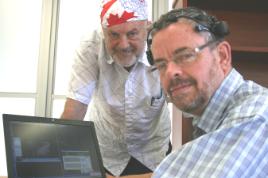Uni gets emotional about 'learning' research
Published on 15 Aug, 2011
Media Contact:For Immediate Release
Cutting-edge technologies that measure brain waves and conductivity of the skin will help CQUniversity researchers discover what excites, annoys or bores people to death about learning...
Housed at the CQUniversity's prestigious Learning and Teaching Education Research Centre (LTERC) at its Noosa Campus, the new equipment includes an electroencephalogram (EEG), which measures electrical activity in the brain, and Affectiva Q-Sensor wristbands that detect temperature and electrodermal changes on the skin.

CQUniversity Associate Professor Mike Horsley trials the brain tracker on CQUniversity Special Project Officer Matt Eliot
Click here to View/Download full-sized Image
LTERC research staff are currently writing software for aligning the state-of-the-art devices, which will be used to monitor students' emotional responses to various types of educational media.
LTERC Director Associate Professor Mike Horsley said researchers aimed to pinpoint what makes people attracted, repelled or indifferent to certain types of learning.
"Emotions are very important in learning because people naturally remember and absorb information better when they connect with it," Professor Horsley said.
"We're going to test the effects types of learning media - such as online and interactive media, video and print - have in producing emotions such as anxiety, frustration, arousal and boredom.
"This new equipment measures the physical signs of emotions - like the change in skin conductivity that results from being frustrated, or changes in certain types of brain waves that are produced when someone is excited."
The addition of the new technologies, together with existing eye-tracking devices - which detect, record and analyse how people view information on computer screens - means the LTERC is one of only four centres worldwide to use the combination of these different types of equipment for learning research, particularly on how people monitor their own learning behaviour.
Professor Horsley said the equipment provided more reliable and verifiable data about peoples' emotions than earlier methods.
"Much of the previous research in this area relied on self-reporting - subjects describing the emotions they felt," Professor Horsley said.
"Because this equipment monitors physical variables, it is much more accurate, reliable and objective, and not dependent on a subject's interpretation of their emotions.
"This eliminates recall errors that could be the result of a poor memory or social factors."
Several projects are already in the pipeline at the LTERC, adding to the Noosa Campus' reputation as one of Queensland's most important research hubs.
Professor Horsley said research into emotional responses to types of learning media was an important topic that has received scant attention in the past.
"We are particularly interested in the link between anxiety and online learning, which has not really been looked at before," Mr Horsley said.
"There is a particularly high attrition rate for online learning and we want to explore that and discover some of the reasons why students find it hard to stick to that type of delivery.
"This is pretty unique and valuable research which will go a long way to putting CQUniversity on the international map in this field of study."
ENDS

